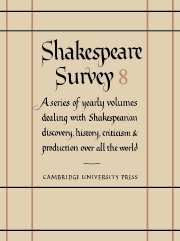Book contents
- Frontmatter
- The Interpretation of Shakespeare’s Comedies: 1900–1953
- Comic Form in Measure for Measure
- Troilus and Cressida
- As You Like It
- The Integrity of Shakespeare: Illustrated from Cymbeline
- Shakespeare’s Comic Prose
- A Note on a Production of Twelfth Night
- Producing the Comedies
- The New Way with Shakespeare’s Texts II. Recent Work on the Text of Romeo and Juliet
- The Significance of a Date
- Of Stake and Stage
- The Celestial Plane in Shakespeare
- International Notes
- Shakespeare Productions in the United Kingdom: 1953
- Shakespeare at Stratford, Ontario
- Plays Pleasant and Plays Unpleasant
- The Year's Contributions to Shakespearian Study 1 Critical Studies
- 2 Shakespeare’s Life, Times and Stage
- 3 Textual Studies
- Books Received
- Index
- Plate section
Producing the Comedies
Published online by Cambridge University Press: 28 March 2007
- Frontmatter
- The Interpretation of Shakespeare’s Comedies: 1900–1953
- Comic Form in Measure for Measure
- Troilus and Cressida
- As You Like It
- The Integrity of Shakespeare: Illustrated from Cymbeline
- Shakespeare’s Comic Prose
- A Note on a Production of Twelfth Night
- Producing the Comedies
- The New Way with Shakespeare’s Texts II. Recent Work on the Text of Romeo and Juliet
- The Significance of a Date
- Of Stake and Stage
- The Celestial Plane in Shakespeare
- International Notes
- Shakespeare Productions in the United Kingdom: 1953
- Shakespeare at Stratford, Ontario
- Plays Pleasant and Plays Unpleasant
- The Year's Contributions to Shakespearian Study 1 Critical Studies
- 2 Shakespeare’s Life, Times and Stage
- 3 Textual Studies
- Books Received
- Index
- Plate section
Summary
Memory plays strange tricks, and it is a somewhat hazardous undertaking to revive recollections of the course of the production of Shakespeare’s comedies over a period of some sixty years. Youthful enthusiasms are responsible for much distortion, but I would never subscribe to the doctrine of “the good old days when everything was so much better than it is today”. As in life itself, the changes in “the mirror of the age” have been so many and so diverse as to have been totally unbelievable half a century ago. So far as Shakespearian comedy is concerned, the diversity has naturally lain in the treatment rather than in the comedies themselves. These are firmly embedded in things elemental to humanity. To suggest “for all time”, a phrase often heard, might be claiming too much, but the settling of any precise period is far beyond our understanding. In everyday parlance, “for all time” is as good a guess as any other.
Before dealing with purely personal recollection of the changes in the production of the comedies, some reference to their treatment in the nineteenth century might be considered.
I have in my possession the prompt copy of the production by Charles Kean of The Winter's Tale in 1856. The time and energy expended to achieve this orgiastic hash exceeds all comprehension. For some unaccountable reason—probably Apollo and the Delphic Oracle—the action was shifted from Bohemia to Bithynia. Hermione's reference to her father, the Emperor of Russia, was, of course, cut. But that was only one of the never-ending excisions. On the front page of the paper binding is a list, presumably written by the stage manager, of the works consulted, including, of all things, an atlas. Among the cast is the name of Ellen Terry—her first appearance on any stage at the age of nine—as Mamillius, and a Miss Heath as Florizel.
- Type
- Chapter
- Information
- Shakespeare Survey , pp. 74 - 80Publisher: Cambridge University PressPrint publication year: 1955



